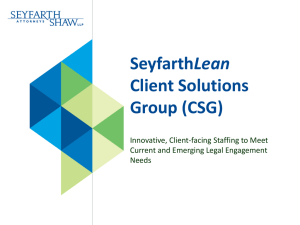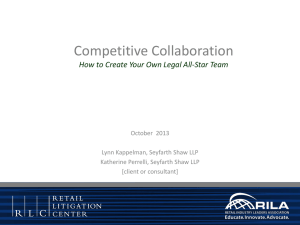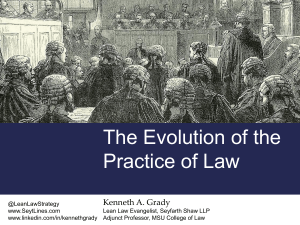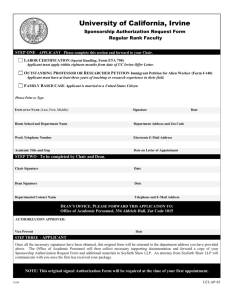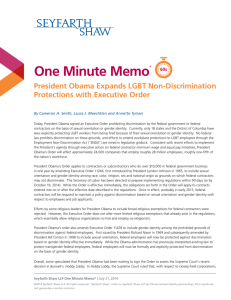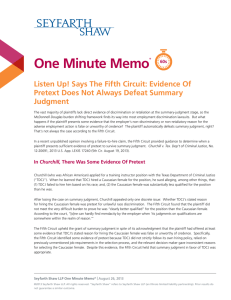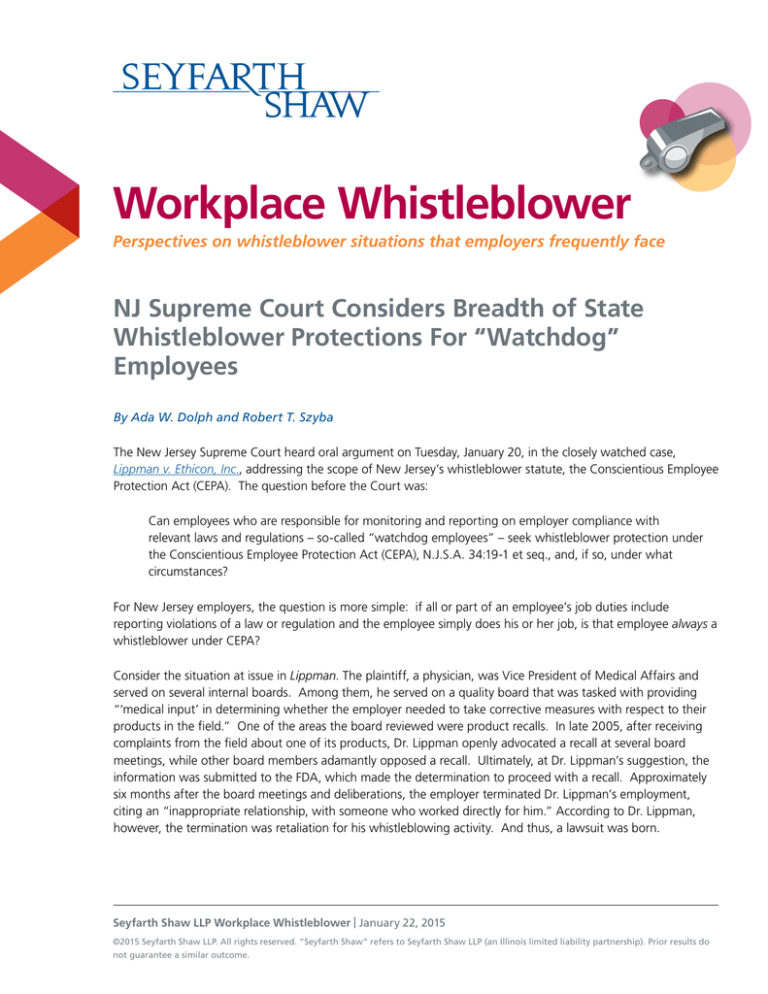
Workplace Whistleblower
Perspectives on whistleblower situations that employers frequently face
NJ Supreme Court Considers Breadth of State
Whistleblower Protections For “Watchdog”
Employees
By Ada W. Dolph and Robert T. Szyba
The New Jersey Supreme Court heard oral argument on Tuesday, January 20, in the closely watched case,
Lippman v. Ethicon, Inc., addressing the scope of New Jersey’s whistleblower statute, the Conscientious Employee
Protection Act (CEPA). The question before the Court was:
Can employees who are responsible for monitoring and reporting on employer compliance with
relevant laws and regulations – so-called “watchdog employees” – seek whistleblower protection under
the Conscientious Employee Protection Act (CEPA), N.J.S.A. 34:19-1 et seq., and, if so, under what
circumstances?
For New Jersey employers, the question is more simple: if all or part of an employee’s job duties include
reporting violations of a law or regulation and the employee simply does his or her job, is that employee always a
whistleblower under CEPA?
Consider the situation at issue in Lippman. The plaintiff, a physician, was Vice President of Medical Affairs and
served on several internal boards. Among them, he served on a quality board that was tasked with providing
“‘medical input’ in determining whether the employer needed to take corrective measures with respect to their
products in the field.” One of the areas the board reviewed were product recalls. In late 2005, after receiving
complaints from the field about one of its products, Dr. Lippman openly advocated a recall at several board
meetings, while other board members adamantly opposed a recall. Ultimately, at Dr. Lippman’s suggestion, the
information was submitted to the FDA, which made the determination to proceed with a recall. Approximately
six months after the board meetings and deliberations, the employer terminated Dr. Lippman’s employment,
citing an “inappropriate relationship, with someone who worked directly for him.” According to Dr. Lippman,
however, the termination was retaliation for his whistleblowing activity. And thus, a lawsuit was born.
Seyfarth Shaw LLP Workplace Whistleblower | January 22, 2015
©2015 Seyfarth Shaw LLP. All rights reserved. “Seyfarth Shaw” refers to Seyfarth Shaw LLP (an Illinois limited liability partnership). Prior results do
not guarantee a similar outcome.
The trial court dismissed the case on summary judgment, finding that because it was Dr. Lippman’s job to raise
issues regarding the safety of Ethicon’s drugs and products, he failed to show that he performed a whistleblowing
activity, citing the Appellate Division’s precedent in Massarano v. NJ Transit. The Appellate Division reviewed
the issue de novo, and found that the trial court correctly applied Massarano, but that Massarano itself was
wrong. It pointed out that CEPA’s plain text does not make a distinction based on an employee’s job duties. To
state a viable, prima facie claim, it requires only that the plaintiff (1) reasonably believed that his/her employer’s
conduct was violating either a law, rule, or regulation promulgated to law, or a clear mandate of public policy; (2)
performed a whistleblowing activity, as defined by CEPA; (3) an adverse employment action was taken against
the employee; and (4) a causal connection exists between the whistleblowing and that adverse employment
action. In the case of “watchdog employees” -- those who “know the relevant standard of care,” and “know
when an employer’s proposed plan or course of action would violate or materially deviate from that standard of
care,” like Dr. Lippman -- the Appellate Division modified the second element of the prima facie case to require
the employee to show that he or she (a) pursued and exhausted all internal means of securing compliance, or (b)
refused to participate in the objectionable conduct. And because the Court concluded that Dr. Lippman satisfied
the “watchdog” prima facie elements, summary judgment was reversed.
At oral argument before the New Jersey Supreme Court, the employer-petitioner focused on two points: First, Dr.
Lippman had made no complaints and had not objected to any unlawful conduct. Instead, while he was on the
quality board, he had the specific role of providing his opinion -- his “medical input” -- as part of the deliberative
process preceding the decision whether to move forward with a product recall. At that stage, the employer was
weighing options, and Dr. Lippman supported one course of action over another. But so did everyone else that
was part of the deliberative process. Their participation in the decision did not make everyone in that process
a whistleblower. They were just doing exactly what they had been hired to do -- to provide their viewpoints
and expertise. In fact, the employer followed Dr. Lippman’s suggestion to submit the data to the FDA for their
determination. Second, it was Dr. Lippman’s job to participate on the quality board. That was all he did. He did
not bring his concerns to, for example, the general counsel, or a compliance officer, or any government agency.
In other words, he performed his job, and nothing more.
The petitioner thus urged the Court to hold that employees who are acting within the scope of their job are
not whistleblowers under CEPA. Petitioner asserted that companies will be discouraged from having quality
boards or compliance personnel, which are otherwise beneficial to the companies and to the public, because
those employees would have the power to entangle the employer in expensive litigation if there is any adverse
action against them. Instead, the Court should encourage companies to have such mechanisms and hire such
employees, without having to risk significant exposure.
Dr. Lippman, on the other hand, argued that CEPA makes all employees potential whistleblowers, regardless of
what their job is, so long as they engage in protected activity. The only limit he would impose: the elements of
the prima facie case. He also argued that it would be an odd result if the Court ruled in the employer’s favor,
because in his situation he would be a whistleblower if he complained of accounting irregularities, but he would
have no protection if his complaint was within his area of expertise. Dr. Lippman pushed the Court to protect
employees who may be in a position to prevent harm to the public or some other unlawful activity, arguing that
the way to do so is provide them with protection under CEPA.
The Court’s questions revealed that it was concerned that employees who complained or objected to unlawful
activity -- regardless of their job duties -- might be silenced by fear of retaliation. And, according to the Court,
even if the employer is sued by such a whistleblower, it could still prevail at trial after presenting all of the evidence
Seyfarth Shaw LLP Workplace Whistleblower | January 22, 2015
©2015 Seyfarth Shaw LLP. All rights reserved. “Seyfarth Shaw” refers to Seyfarth Shaw LLP (an Illinois limited liability partnership). Prior results do
not guarantee a similar outcome.
to a jury. On the other hand, the Court appeared to recognize that the expansive reading and the fact questions
involved would create untouchable employees, drive up risk and litigation costs, and create a chilling effect on
companies’ willingness to hire these so-called “watchdog” employees. Interestingly, neither the Court nor the
parties discussed the Appellate Division’s modified prima facie elements as a viable compromise.
Depending on the Court’s decision in Lippman, New Jersey employers will have further guidance on handling
employee complaints and CEPA coverage, as well as the risk analysis associated with the employment of
watchdog employees.
With the parties’ arguments in, we await the Court’s decision. We will keep you posted on further
developments.
Ada W. Dolph is a partner in Seyfarth Shaw LLP’s Chicago office. Robert T. Szyba is an associate in the firm’s New
York office. If you would like further information on this topic, please contact a member of the Whistleblower
Team, your Seyfarth attorney, Ada W. Dolph at adolph@seyfarth.com or Robert T. Szyba at rszyba@seyfarth.com.
www.seyfarth.com
Attorney Advertising. This Workplace Whistleblower alert is a periodical publication of Seyfarth Shaw LLP and should not be construed as legal advice or a legal opinion on any specific
facts or circumstances. The contents are intended for general information purposes only, and you are urged to consult a lawyer concerning your own situation and any specific legal
questions you may have. Any tax information or written tax advice contained herein (including any attachments) is not intended to be and cannot be used by any taxpayer for the
purpose of avoiding tax penalties that may be imposed on the taxpayer. (The foregoing legend has been affixed pursuant to U.S. Treasury Regulations governing tax practice.)
Seyfarth Shaw LLP Workplace Whistleblower | January 22, 2015
©2015 Seyfarth Shaw LLP. All rights reserved. “Seyfarth Shaw” refers to Seyfarth Shaw LLP (an Illinois limited liability partnership). Prior results do
not guarantee a similar outcome.


